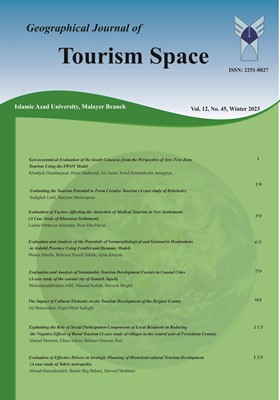Explaining the Role of Social Participation Components of Local Residents in Reducing the Negative Effects of Rural Tourism
(A case study of villages in the central part of Fereydoun County)
Subject Areas :
ahmad momeni
1
,
elnaz asherigafshe
2
,
behnaz ghasemirad
3
1 - Ph.D. student of rural planning at Gilan University, Gilan, Iran
2 - Ph.D. student of rural planning at Gilan University, Gilan, Iran
3 - Ph.D. student of rural planning at Gilan University, Gilan, Iran
Received: 2022-12-26
Accepted : 2023-01-21
Published : 2023-02-20
Keywords:
recognition,
Rural tourism,
awareness,
Local community,
Social Participation,
Abstract :
Tourism is a community-based industry, and the participation of residents is crucial for its success and long-term sustainability. This research aims to explore the role of social participation components of local residents in reducing the negative consequences of rural tourism in the central part of Faridan. The research is of an applied type, and in terms of research method, it is a descriptive-survey type based on a questionnaire. The statistical population of the research includes the residents of villages in the central part of Faridan, which according to the last census of 2015, is equal to 14,050 people and 4,673 households. Using Cochran's formula, a sample size of 375 people was sampled. A researcher-made questionnaire was used as the measuring instrument and the face validity was verified by a panel of experts. Its reliability was calculated based on Cronbach's alpha formula, ranging between 0.963 and 0.776 for different components. The questionnaire was randomly distributed among the residents based on the distribution of the village population. The findings suggest a positive and significant relationship between all the effective components of the research (social participation) and the socio-cultural variable. In the regression test, it was found that the educational level had a more significant effect compared to other variables in improving rural tourism. Therefore, increasing participation through social capital can lead to the improvement of tourism and the reduction of the social consequences of tourism in the villages of the studied region.
References:
افراخته، ح. 1393. جغرافیای روستایی ایران، تهران، چاپ اول، انتشارات سمت.
اوکلی، پ. 1371. رهیافتهای مشارکت در توسعه روستایی، ترجمه منصور محمود نژاد. سلسله انتشارات روستا و توسعه. وزارت جهاد سازندگی. 119-1.
تولایی، س، سلیمانی، م، جهانی دولت آباد، ر، جهانی دولت آباد، ا. 1393. نقش مشارکت جوامع محلی در صنعت گردشگری مطالعه موردی: سرعین، فصلنامه پژوهشهای جغرافیای انسانی، 49(1): 113-95.
رحمانی فضلی، ع، سجادی، ژ، صدیقی، ص. 1397. نقش گردشگری خانههای دوم در تشدید فرایند کالایی شدن فضا مطالعه موردی: عرصههای روستایی شهرستان محمودآباد، مجله برنامهریزی و توسعه گردشگری، 7 (27):82-56.
رکنالدین افتخاری، عبدالرضا، مهدوی، داوود، پورطاهری، مهدی (1389). فرایند بومیسازی شاخصهای توسعه پایدار گردشگری روستایی در ایران، فصلنامه پژوهشهای روستایی، شماره4. صص41-1.
شفیعی ثابت، ن، هراتی فرد، س. 1398. توانمندسازی ذینفعان محلی برای مشارکت در توسعه پایدار گردشگری با نقش میانجی اثرات ادراک شده از گردشگری، فصلنامه علمی پژوهشی برنامهریزی و توسعه گردشگری، 8(2): 90-72.
شفیعی ثابت، ن، هراتی فرد، س. 1394. تأثیر مشارکت تور گردانها در پایداری و توسعه سکونتگاههای محلی منطقه تهران و البرز، مجله برنامهریزی و توسعه گردشگری، 4(13): 119-93.
شمس، م، فرهادیان، پ. 1397. نقش گردشگری در تحولات اقتصادی(مطالعه موردی: شهر ملایر)، فصلنامه جغرافیایی فضای گردشگری، 8(29): 22-1.
میسرا، آرپی (1365). مشارکت مردمی، نشریه جهاد. سال ششم، شماره 89.
هاشمی بیستونی، م. ر، شمس، م. 1398. تحلیل و ارزیابی شاخصهای حکمروایی شهری خوب و تأثیر آن بر متغیر توسعه گردشگری در شهر بیستون، فصلنامه جغرافیایی فضای گردشگری، 9(33): 37-17.
Amundsen، Martinsen، Q. L. (2015). Linking empowering leadership to job satisfaction، work effort، and creativity: The role of self-leadership and psychological empowerment. Journal of Leadership & Organizational Studies، 3(22)، 304-323.
Bermúdez، L. (2007). Self-consciousness. The Blackwell companion to consciousness، 456-467.
Boavida-Portugal، Rocha، J. Ferreira، C. (2016). Exploring the Impacts of Future Tourism Development on Land Use/Cover Changes. Applied Geography. 77(4)، 82- 91.
Choi، C. Sirakaya، E. (2006). Sustainability indicators for managing Community tourism. Journal of Tourism Management، 27(6)، 1274- 1289.
Gardiner، Kwek، A. (2017). Chinese Participation in Adventure Tourism: A Study of Generation Y International Students’ Perceptions، Journal of Travel Research، 56(4)، 496-506.
Giampiccoli، Saymaan، M. (2017). Community-based tourism، responsible tourism، and infrastructure development and poverty. Afr J Hosp Tour Leisure، (6)، 1-28.
Inkson، Gunaz، Hungh. Ganesh، Shiv. Roper، Juliet (2012). Boundaryless careers: Bringing Back Boundaries، see discussions. stats، and author profiles for this publication at: http://www. researchgate. net
Jones، (2005). Community-Based Ecotourism: the Significance of Social Capital. Annals of Tourism Research، 32(2): 303-324.
Lepp، (2007). Residents’ Attitudes towards Tourism in Bigodi Village، Uganda. Tourism Management، (28) 876-885.
Martens، (2001). Communicative planning theory: change needed to change practice، Rreflections، 5(3): 283-306.
Mubita، Libati، M. & Mulonda، M. (2017). The Importance and Limitations of Participation in Development Projects and Programmes. European Scientific Journal، ESJ، 13(5) 238-256.
Oriade، & Robinson، P. (Eds). (2017). Rural Tourism and Enterprise: Management، Marketing and Sustainability. CABI.
Tosun، (2006). Expected Nature of Community Participation in Tourism Development. Tourism Management، 27، 493-504.
Tour Operators Initiative (2007). Integrating sustainable into the tour operators’ supply chain. Http://www. toinitative. org/index. php?id=53 Accessed the 14 of June 2009، at 12:30. 1-3.
Wang، (2006). Rural Community Participation in Tourism Development: Cases from Hainan Province، China. Unpublished Ph. D. Dissertation، Waterloo (Ontario): University of Waterloo
Small، and Harris، C. (2012)، Obesity and tourism: Rights and responsibilities. Annals of Tourism Research، 39(2)،686-707.
_||_


